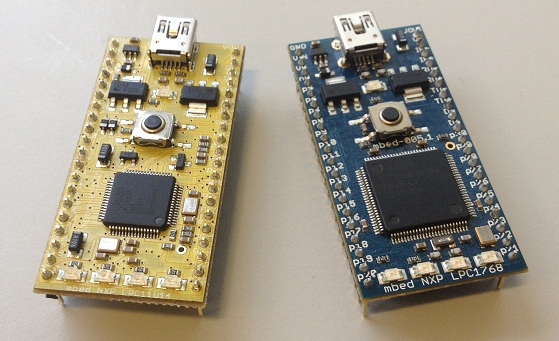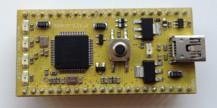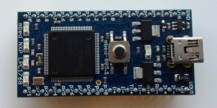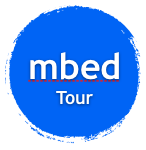You are viewing an older revision! See the latest version
mbed Microcontrollers
The mbed Microcontroller boards are designed to enable fast and flexible rapid prototyping with microcontrollers.
The mbed Microcontroller is packaged as a small 40-pin DIP, 0.1-inch pitch form-factor making it convenient for prototyping with solderless breadboard, stripboard, and through-hole PCBs. It includes a built-in USB programming interface that is as simple as using a USB Flash Drive. Plug it in, drop on an ARM program binary, and its up and running!
 |
| mbed NXP LPC11U24 (left) and mbed NXP LPC1768 (right) |
The USB drag ‘n’ drop programming interface works with Windows, Mac OS X and Linux, meaning you can re-flash the microcontroller without needing drivers or a programming application. The program binary can be easily generated using the mbed Online Compiler, or alternatively using any other standard toolchain like Keil uVision, Code Red, or GCC.
There is also support for a virtual serial port using the same USB interface, enabling communication with a PC terminal, Labview, Matlab, and any other programming language that can communicate with a COM port.
mbed Microcontroller Variants¶
The same rapid prototyping form-factor and functionality is available for a number of different microcontroller targets, suitable for prototyping different applications:
| mbed NXP LPC11U24 | mbed NXP LPC1768 | |
|---|---|---|
 |  | |
| Intended applications | USB Devices Battery powered 8/16-bit applications | Ethernet USB Host Powerful applications |
| Best for low power |  | |
| Best for low cost chip |  | |
| Best for performance |  | |
| Best connectivity |  | |
| Specifications of core | ||
| Core | ARM Cortex-M0 | ARM Cortex-M3 |
| Frequency | 48MHz | 96MHz |
| FLASH | 32KB | 512KB |
| RAM | 8KB | 32KB |
| Power | 1-16mA (Vb) | 60-120mA (Vin) |
| Peripherals | ||
| Ethernet |  | |
| USBHost |  | |
| USBDevice |  |  |
| SPI |  (2) (2) |  (2) (2) |
| I2C |  (1) (1) |  (2) (2) |
| CAN |  (2) (2) | |
| AnalogIn |  (6) (6) |  (6) (6) |
| PwmOut |  (8) (8) |  (6) (6) |
| AnalogOut |  (1) (1) |
mbed NXP LPC11U24¶
The mbed NXP LPC11U24 is ideal for prototyping low-cost USB devices, battery powered applications and products that could take advantage of ARM Cortex-M0 based 32-bit MCUs.
This mbed Microcontroller board is based on the NXP LPC11U24 with a 32-bit ARM Cortex-M0 core running at 48MHz, 32KB FLASH, 8KB RAM and peripherals including USB Device, I2C, UART, SPI, ADC and other I/O interfaces.
- For full details, see mbed NXP LPC11U24
mbed NXP LPC1768¶
This mbed Microcontroller board is based on the NXP LPC1768 with a 32-bit ARM Cortex-M3 core running at 96MHz, 512KB FLASH, 64KB RAM and lots of interfaces including built-in Ethernet, USB Host and Device, CAN, SPI, I2C, ADC, DAC, PWM and other I/O interfaces.
The NXP LPC1768 microcontroller is our most full featured board and is great for all kinds of general prototyping. If you're not sure which mbed to get, this is your best choice.
- For full details, see mbed NXP LPC1768
